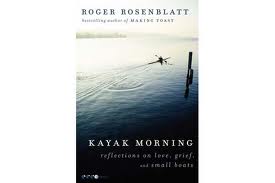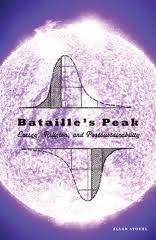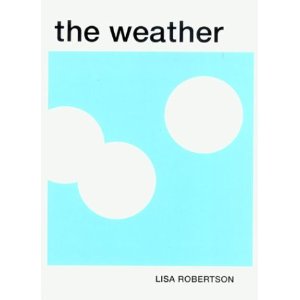Being sick in the early days of 2013 has me behind in January’s writing, syllabus-making, and other chores — but before it gets too late I wanted to put some notes in on a few of the good books I read in the second half of 2012.
Lisa Robertson, The Weather
A book of experimental poetry that I bought at Powell’s in Portland on the suggestion of Dan Remein (I think), this is a smart & unsettled look at how the weather gets under our skin and into our consciousness. A few notable lines —
Lurid conditions are facts (6)
My purpose here is to advance into / the sense of the weather, the lesson of / the weather (24)
Every surface is ambitious; we excavate a non-existent era of the human (30)
The word double is written on our forehead (39)
It is too late to be simple (76).
Roger Rosenblatt, Kayak Morning: Reflections on Love, Grief, and Small Boats
A very different feel comes from Rosenblatt’s memoir about kayaking near his home in Quogue and thinking about the recent death of his 38-year old daughter. This formless memoir has some very deft moments, esp when he’s paddling and thinking about water, culture, family, mortality. Sometimes he says things I very much agree with, like this: “Too much is made of the value of plumbing the depths. The nice thing about kayaking is that you ride the surface” (55). Also: “words mixed with water lose their bite” (54).

I found this one via my friend John Gillis, author of The Human Shore, a great new maritime history that I’ll blog about soon. He suggest it to me after reading Rosenblatt’s comments about water and the English language:
So many references. A loose cannon. A drifter. Sea legs. The English language, it seems, is water based. Other languages too, I guess. The world talks to itself from the sea, ship to shore. I recently learned that ‘rival’ comes from rivers, or streams, meaning someone on the opposite side of the same stream. (71)
In places this book seems oddly willing to traffic in its own intimacy, to sell its insights in a way that perhaps lessons their value. But in places the writing rests happy with the spaces left open, in between —
Water is groundless. It has no basis, like art. It is the answer to no one’s question. I love the feel of it. (104)
Allan Stoekl, Bataille’s Peak: Energy, Religion, and Postsustainability
I found this one too late to sneak a reference into my PMLA essay, “After Sustainability,” but it’s a smart & lively excursus into what might come after “fossil fuel humanism” (xiv). Bataille’s counter-proposal is an ethics of excess, for which the central problem isn’t hoarding energy but dissipating its excess: “so too in the future we can posit sustainability as an unintended afteraffect of a politics of giving” (142). “Ecoreligion,” in Bataille’s terms, requires a “sacrificial relation between humans, animals, plans — the ecosystem,” as well as “the recognition of the relatively minor position of humanity, finally, in the concentration and expenditure of the energy of the universe” 178). Or, to put it more starkly: “The human community’s physical survival (through sacrificial consumption) in this model is the fundamentally unplanned aftereffect of a sacred ‘communication’ with the animal (179). 
Some parts of this seem unnecessarily abstract, though the contrast between the automobile as figure of modernity — “In the car we do not need a body” (184) — and the bicycle as post-modern challenge to that system — “The cyclists body is little more than an open wound” (192) — brings the focus directly back to the visible world. What Stoekl calls “a regime of eroticized recycling and bicycling” (193) seems very much worth thinking and rethinking.

Leave a Reply